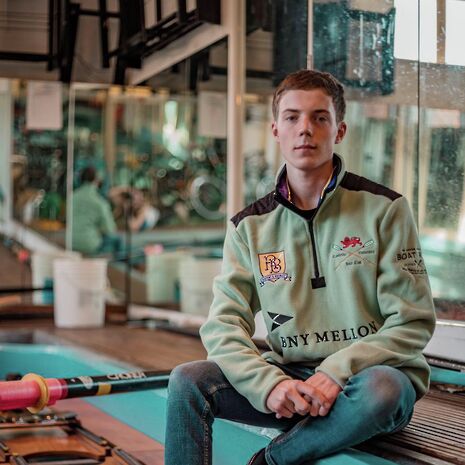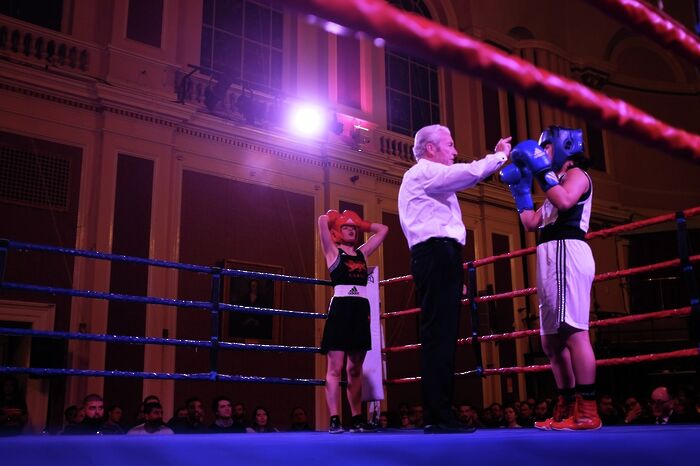Matthew Holland, CUBC cox: “They are immensely experienced – and that comes across in the way they race”
William Ross chats the Boat Race, balancing rowing and academics, and what it would mean to cox on his home patch with experienced CUBC cox Matthew Holland

“I’m up at 5:15 in the morning, so that I can be in the gym for quarter past six. As cox, I’ll stand and assist with the ergos and the training – my job in the gym in the morning is to try to make sure that everyone is doing the right thing and everyone’s in a position equipped to train properly. We’re finished by nine, and then I have lectures until 10 or 11. I’ll then try and get in the lab for a couple of hours before running back to college for lunch. We’re then on the water from 13:30 till around 18:30. And then back home, supervisions, work, sleep, repeat!”
A day in the life of Matthew Holland, a third year undergraduate natural scientist at Gonville & Caius specialising in chemistry, is not that of a typical Cambridge student. Charming and gregarious, it is Holland’s positive get-up-and-go attitude to life that really shines through in speaking to him.
How though, I wonder, does Holland, who was also previously a choral scholar and still takes singing lessons, cope with combining such an intensive rowing training schedule with one of Cambridge’s most contact-hour heavy and most demanding undergraduate degrees?
“I’m unlikely to win them the race but I could potentially lose them the race”
“I like being busy. I always find that I work best when I’m busy. Unless there’s a bit of time pressure, it’s quite easy to sit down with a piece of work and waste three or four hours doing it because you’ve got three or four hours to do it. Whereas I find that if you’ve only got an hour and a half to do it, and you just sit down and knuckle down and get through it, you can produce as good a quality piece of work in half the time.”
Having learnt to row at Westminster School and coxed the Women’s Blue boat to victory as a fresher in 2017, Holland has great experience in his role. Asked about the differences between coxing a men’s boat and a women’s boat, he notes:
“For me, the principal difference is that each crew has its own personality. Each crew is different and the characters in it form the character of the crew and that’s what defines the crew – that’s what makes the difference, not whether it’s a male or female crew.”
What, then, is the character of this year’s crew?
“This year’s men’s Blue boat is excitable. It’s immensely experienced and that certainly comes across in the way that they execute their racing – they love racing. Sometimes they can be a bit quiet – we’ve got some people who just like to knuckle down and get on with the work. And then we’ve got some slightly louder people – Freddie Davidson, for example, is nice and loud and makes lots of calls, whereas others are a bit quieter. That blend works quite well.”
The most accomplished of this year’s experienced squad is undoubtedly 47 year-old James Cracknell, double Olympic gold medallist and six-time World Rowing Championship gold medalist.
Holland is effusive in his praise of the impact that Cracknell has had around the squad: “What’s really helpful is the fact that he’s done it so frequently, he’s done so many training sessions, so many races that he’s able to judge the character of the crew and chip in at the right time. So, for example, after a bad session, he’s able to perk us up and tell us to look forward to tomorrow because we’re going to put it right.”
If included in the final crew, Cracknell would become the oldest man to ever compete in the Boat Race, but Holland remains tight-lipped on this possibility: “He’s got as much as a chance as anyone and he’s done very well in the last couple of months to put himself in a strong position but what happened in the past happened in the past – just because he’s got two olympic gold medals and six world championships doesn’t mean that he’s guaranteed a seat in the Blue Boat. He’ll have to earn it. And there are lots of people who would relish the chance to seat-race James Cracknell out of the boat. He’s going to have a tough job but he could do it and he’s definitely capable of doing it.”
“I spent five years of my life rowing on that course. It’s my home water, essentially, because I spent so long there”
As the interview draws to a close, we look ahead to the season-defining race on the 7th April on the Thames, when the Cambridge crew will be looking to retain their title against perennial rivals Oxford in front of the packed banks of the River Thames and an estimated 5 million television viewers worldwide. Holland, though, seems typically unflustered by the prospect of racing in such a high-profile race.
“I’m really looking forward to it. As a cox, the steering in London is not straightforward. It’s not as simple as going straight down a course – there’s a river with a stream in it and there is a part of the river that is faster than the other. My principal job in London is to make sure that my crew is in the best possible position that it can be in which means that I’ve got to make sure that we’re in faster water than Oxford at every stage down the course.
“On top of that, my job is to relay what I think that we need to do to do better, and to relay what the coach wants – to make sure that everyone stays focussed on what the coach wants. I like to think of myself as more of a facilitator than anything else. I’m unlikely to win them the race but I could potentially lose them the race.”
Holland’s confidence is perhaps borne out of the fact that he has a certain advantage when it comes to racing on the Thames: “Because I learnt to row at Westminster school, I spent five years of my life rowing on that course. That doesn’t mean that I don’t have things to learn, but I can steer it without thinking so much about it which I think is a useful skill to have. It’s my home water, essentially, because I spent so long there”
Experienced, self-assured and even rowing on his home patch, there are surely few better-equipped to cox a Blue Boat than Matthew Holland.
 News / SU reluctantly registers controversial women’s soc18 December 2025
News / SU reluctantly registers controversial women’s soc18 December 2025 Features / Should I stay or should I go? Cambridge students and alumni reflect on how their memories stay with them15 December 2025
Features / Should I stay or should I go? Cambridge students and alumni reflect on how their memories stay with them15 December 2025 News / Dons warn PM about Vet School closure16 December 2025
News / Dons warn PM about Vet School closure16 December 2025 News / Cambridge study finds students learn better with notes than AI13 December 2025
News / Cambridge study finds students learn better with notes than AI13 December 2025 News / Uni registers controversial new women’s society28 November 2025
News / Uni registers controversial new women’s society28 November 2025










